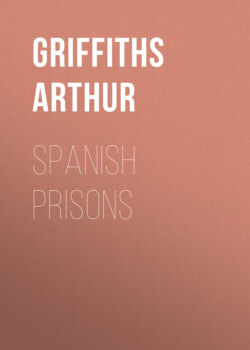Spanish Prisons

Реклама. ООО «ЛитРес», ИНН: 7719571260.
Оглавление
Griffiths Arthur. Spanish Prisons
Spanish Prisons
Table of Contents
INTRODUCTION
CHAPTER I
CHAPTER II
CHAPTER III
CHAPTER IV
CHAPTER V
CHAPTER VI
CHAPTER VII
CHAPTER VIII
CHAPTER IX
CHAPTER X
Footnote
Отрывок из книги
Arthur Griffiths
The Inquisition at Home and Abroad, Prisons Past and Present
.....
There was evidently too much work for two men, so in February, 1482, seven additional inquisitors were commissioned by the pope on the nomination of the sovereigns, and some of these were exceedingly zealous. There was, however, much confusion because of the lack of a unifying authority. The sovereigns were determined that the institution must be kept under the control of the state, and so a council of administration usually called la Suprema was added to those already existing, and was charged with jurisdiction over all measures concerning the faith. At the head was placed a new officer, later called the inquisitor-general. The inquisitor-general was hardly a subject. He had direct access to the sovereign and exercised absolute and unlimited power over the whole population and was superior to all human law. No rank, high or low escaped his jurisdiction. Royal personages were not exempt from his control, for the Holy Office invaded the prince's palace as well as the pauper's hovel. There was no sanctity in the grave, for corpses of heretics were ruthlessly disinterred, mutilated and burned.
The first inquisitor-general under the new organisation was Thomas de Torquemada, who has won for himself dreadful immortality from the signal part he played in the great tragedy of the Inquisition. He was a Dominican monk, a native of old Castile, who had been confessor and keeper of the Queen's conscience to Isabella in her early days and constantly sought to instil his fiery spirit into her youthful mind. "This man," says Prescott, "who concealed more pride under his monastic weeds than might have furnished forth a convent of his order, was one of that class with whom zeal passes for religion and who testify their zeal by a fiery persecution of those whose creed differs from their own; who compensate for their abstinence from sensual indulgence by giving scope to those deadlier vices of the heart, pride, bigotry and intolerance which are no less opposed to virtue and are far more extensively mischievous to society." The cruelties which he perpetrated grew out of a pitiless fanaticism, more cruel than the grave. He was rigid and unbending and knew no compromise. Absolutely fearless, he directed his terrible engine against the suspect no matter how high-born or influential.
.....